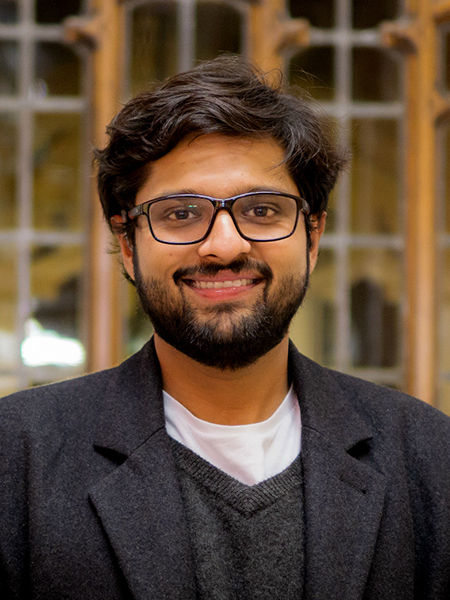Allen School Ph.D. student Dhruv (DJ) Jain has received a Microsoft Research Dissertation Grant for his work on “Sound Sensing and Feedback Techniques for Deaf and Hard of Hearing Users.” This highly selective grant aims to increase diversity in computing by supporting doctoral students who are underrepresented in the field to “cross the finish line” during the final stages of their dissertation research.
Jain, who is co-advised by Allen School professor Jon Froehlich and Human Centered Design & Engineering professor and Allen School adjunct professor Leah Findlater, works in the Makeability Lab to advance sound accessibility by designing, building and deploying systems that leverage human computer interaction (HCI) and artificial intelligence (AI). His primary aim is to help people who are d/Deaf and hard of hearing (DHH) to receive important and customized sound feedback. The dissertation grant will support Jain’s continuing work on the design and evaluation of three of these systems.
One of his projects, HomeSound, is a smart home system that senses and visualizes sound activity like the beeping of a microwave, blaring of a smoke alarm or barking of a dog in different rooms of a home. It consists of a microphone and visual display, which could be either a screen or a smartwatch, with several devices installed throughout the premises. Another system, SoundWatch, is an app that provides always-available sound feedback on smartwatches. When the app picks up a nearby sound like a car honking, a bird chirping or someone hammering, it sends the user a notification along with information about the sound. Jain also has contributed to the development of HoloSound, an augmented reality head-mounted display system that uses deep learning to classify and visualize the identity and location of sounds in addition to providing speech transcription of nearby conversations. All three projects are currently being deployed and tested with DHH users.
“Dhruv is a dedicated researcher who draws on his own unique life experiences to design and build interactive systems for people who are deaf or hard of hearing,” Froehlich said. “DJ cares not just about academic results and solving hard technical problems but in pushing towards deployable solutions with real-world impact. SoundWatch is a great example: DJ helped lead a team in building a real-time sound recognizer in the lab that they then translated to an on-watch system deployed on the Google Play Store. Thus far, it’s been downloaded over 500 times.”
Over the course of his research, Jain has published 20 papers at top HCI venues such as the Association for Computing Machinery’s Conference on Human Factors in Computing Systems (CHI), Symposium on User Interface Software and Technology (UIST), Designing Interactive Systems Conference (DIS) and Conference on Computers and Accessibility (ASSETS). His work has received two Best Paper Awards, three Best Paper Honorable Mentions and one Best Artifact Award.
Learn more about the 2021 grant recipients here.
Congratulations, DJ!


